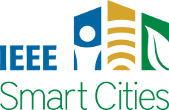September 2021
Smart Cities - September eNewsletter
For a downloadable copy of this eNewsletter, please visit the IEEE Smart Cities Resource Center.
Resource Center Update: Improved user experience for IEEE members! Access/Download free products without a checkout process.
Written by Elli Ntakou, F. Selin Yanikara, Jeff Schlegelmilch
Climate change has been acknowledged as an area of crisis worldwide, with record-breaking temperatures and severe storms, among many other current and looming impacts. In response, countries have created or adopted plans and formed agreements and coalitions to mitigate and adapt to climate change with tiered goals [1], [2], [6]-[8]. Central to these goals are decarbonization of our energy sector and electrification of transportation sector in addition to broader infrastructure improvements to mitigate the pace of climate change, and adaptation to the consequences that cannot be avoided, by improving resilience. In the chain of mitigation and adaptation actions needed, the participation of cities is at the forefront. On one hand, city infrastructure and services are affected by mitigation and adaptation strategies for climate change, while, on the other hand, these measures need to take into account the cities’ social environment to be effective. This article explores the current city climate plans across the US and suggests guidelines for strengthening these plans through a granular, quantitative case-specific evaluation of progress and solution ranking/prioritization based on the regulatory environment, local priorities, as well as funding and other monetary opportunities for cities. Acknowledging that the electric grid is a key enabler to climate change adaptation and mitigation measures’ application and, concurrently, a lifeline to communities, this article explores ways of effective collaboration between the city and the corresponding electric power utilities so that both parties progress against their climate and other related goals.
Written by Roberto Menozzi and Dario Costi
This article summarizes the motivation, ongoing activities, research challenges, and the inspiring principles of a research laboratory called Smart City 4.0 Sustainable LAB (SC4.0SL), founded in 2018 at the University of Parma to support public administrations and institutions and local stakeholders in the smart city transition, and developed in 2019 into a regional initiative involving all the universities of the Emilia-Romagna region. SC4.0SL aims at fostering a deeply interdisciplinary and holistic approach to the development of smart and wise cities and towns that encompasses the penetration of new technologies, the advancement of sustainability policies, the valorization of artistic and cultural heritage, and a principle of inclusiveness applied to both people and places. The active research directions and the research and intervention challenges – embodied by a series of pilot project proposed to the regional government and local administrations – are briefly described in the article.
Written by Gayatri Doctor, Poornima Dore, and Irene Anna Shaji
This article analyses the Indian Smart Cities' open data digital transformation journey. Data by itself has no purpose; it is a resource that needs to be leveraged. India’s urban population has risen from 6.2% (in 1951) to 31.2% (in 2011), 34.93% live in urban areas as of 2020, and projections indicate it might touch 40% by 2031 [1]. The Indian cities are undergoing rapid urbanization and have limited resources at their disposal. This requires developing a truly effective system of governance with the use of high-quality, timely, and granular data. Data-driven governance can assist in driving informed decisions, set implementation goals, and also helps increase transparency and accountability. India visioned an ambitious plan to make 100 Smart Cities and introduced initiatives, like the Data Smart Cities Strategy (DSC) [2], the Smart Cities Open Data Portal [3], the Data Maturity Assessment Framework (DMAF) [4], the City Data Policy (CDP) [5], and the City Data Officer (CDO) [6].
Written by Sathiyakeerthi M
In the coming years, the promising concept of smart cities is going to completely revolutionize human lives. Its technological advancements are making their way to improve the current transportation systems, homes, healthcare departments, energy, secure building infrastructures, farming and much more, making them smarter than ever. What is even a better addition to this is the introduction of drones in smart cities as an aid to enhance the lives of citizens and speed up the service delivery process. Drones are basically the unmanned aerial vehicles that move from one point to another autonomously, via software-controlled flight plans, providing coverage as well as performing key operations such as monitoring, surveillance, management, etc. This cutting-edge technology offers immense applications due to its cost-effective service provision and efficiency [1].
In Smart Cities, drones are expected to play numerous roles such as in medical care, package delivery, police operations, traffic monitoring, signal coverage, relaying, disaster management, agricultural operations, security, firefighting and many more [2-4]. The 5G network, as the latest wireless communication technology featuring ultra-high speed, super low latency, and massive connectivity, is bound to have a profound impact on smart cities [5][6]. With high bandwidth, 5G supports ultra-high-definition video transmission with low latency, which comes in handy during the remote control of drones in emergency situations. A majority of drones have currently their communication encrypted and are controlled via Wi-Fi, but 5G will allow them to fly to a much larger area, while being less susceptible to hacker interference. Hence, the integration of 5G characteristics in modern drones will be a remarkable achievement towards turning the idea of an ideal smart city into reality [7-9].
To have the eNewsletter delivered monthly to your inbox, join the IEEE Smart Cities Community.
Past Issues
To view archived articles, and issues, which deliver rich insight into the forces shaping the future of the smart cities. Older eNewsletter can be found here. To download full issues, visit the publications section of the IEEE Smart Cities Resource Center.



